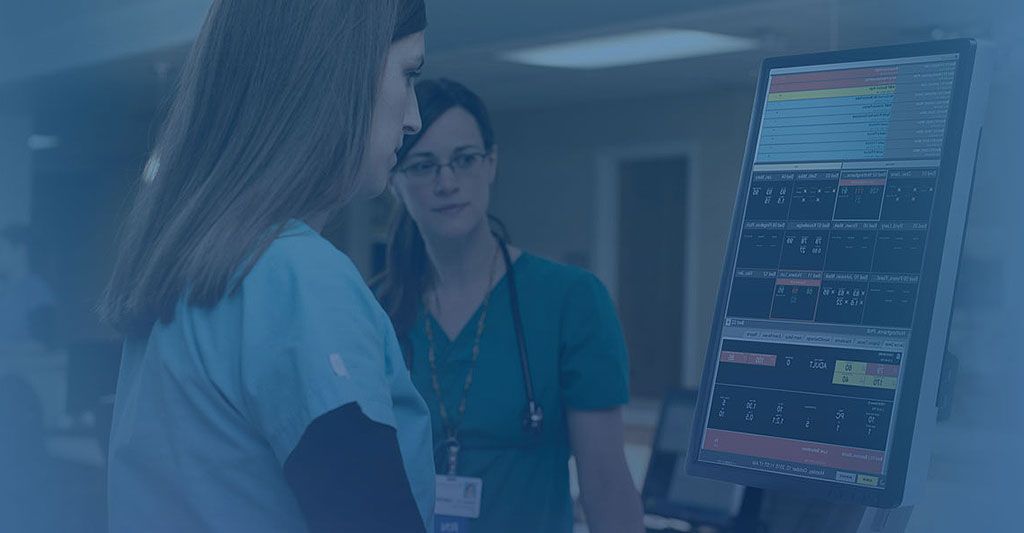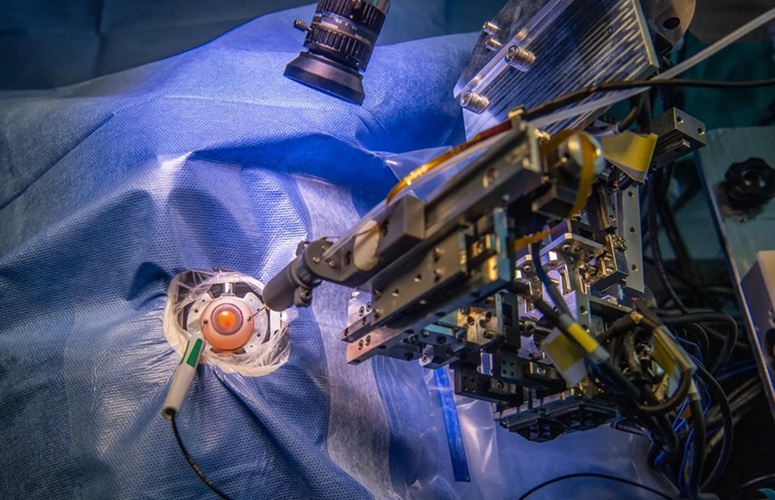New Workstation Helps Meet COVID-19 Care Demands
|
By HospiMedica International staff writers Posted on 01 Jun 2020 |

Image: The VPS workstation (Photo courtesy of Capsule Technologies)
An innovative ventilated patient surveillance (VPS) workstation allows centralized remote observation of patients' ventilator data.
The Capsule Technologies (Andover, MA, USA) VPS workstation allows users to view real-time and trended clinical respiratory measurements in a centralized, environmentally safe remote location. Measures include fraction of inspired oxygen (FiO2), Set Tidal Volume, Exhaled Tidal Volume, Set Respiration Rate, Total Respiration Rate, Peak Inspiratory Pressure, and Positive End Expiratory Pressure. This allows healthcare staff to manage patients closely, but without having to be physically close, and rapidly identify clinically actionable emergent events.
The centralized view of ventilator data reduces bedside visits for non-actionable events, limiting the caregivers' exposure to infection, but also reduces institutional consumption of personal protective equipment (PPE), which saves time, money, and the equipment itself. Care providers also have greater availability to act during clinically actionable events, leading to shortened response times, which can improve patient safety and outcomes.
The VPS workstation is a tailored configuration of the company's Capsule Surveillance solution, which integrates health data, including waveforms, from any medical device or clinical system. The system contextualizes all available data and transforms it into visible, actionable, predictive insight. Clinicians can make timely assessments and react using customized protocols, based on predictive analytics and at-a-glance dashboards. Patient care is also improved with less charting errors, more timely charting, and more modifiers and custom fields.
“For our existing clients, adding ventilated patient surveillance is a simple, yet impactful, way to extend the utility of their Capsule installations,” said Hemant Goel, CEO of Capsule Technologies. “Technology is a key enabler, and we are directing all resources to support our clients' urgent needs to reduce risks, increase efficiencies and extend the reach and availability of resources. Our Ventilated Patient Surveillance workstation offers remote, continuous visibility on critical, respiratory-compromised COVID-19 patients while supporting clinical decisions and helping staff limit their exposure.”
“Implementation went quickly and smoothly, which was helpful during the rush of coronavirus cases. We have used ventilated patient surveillance to identify clinically actionable emergent events,” said Mary Stein-Ferrer, director of clinical informatics at the University of Miami Health System (FL, USA). “Viewing and assessing comprehensive ventilation data on the workstation before entering a patient room reduces the amount of time that our nurses and respiratory therapists spend in that potentially infectious environment.”
Related Links:
Capsule Technologies
The Capsule Technologies (Andover, MA, USA) VPS workstation allows users to view real-time and trended clinical respiratory measurements in a centralized, environmentally safe remote location. Measures include fraction of inspired oxygen (FiO2), Set Tidal Volume, Exhaled Tidal Volume, Set Respiration Rate, Total Respiration Rate, Peak Inspiratory Pressure, and Positive End Expiratory Pressure. This allows healthcare staff to manage patients closely, but without having to be physically close, and rapidly identify clinically actionable emergent events.
The centralized view of ventilator data reduces bedside visits for non-actionable events, limiting the caregivers' exposure to infection, but also reduces institutional consumption of personal protective equipment (PPE), which saves time, money, and the equipment itself. Care providers also have greater availability to act during clinically actionable events, leading to shortened response times, which can improve patient safety and outcomes.
The VPS workstation is a tailored configuration of the company's Capsule Surveillance solution, which integrates health data, including waveforms, from any medical device or clinical system. The system contextualizes all available data and transforms it into visible, actionable, predictive insight. Clinicians can make timely assessments and react using customized protocols, based on predictive analytics and at-a-glance dashboards. Patient care is also improved with less charting errors, more timely charting, and more modifiers and custom fields.
“For our existing clients, adding ventilated patient surveillance is a simple, yet impactful, way to extend the utility of their Capsule installations,” said Hemant Goel, CEO of Capsule Technologies. “Technology is a key enabler, and we are directing all resources to support our clients' urgent needs to reduce risks, increase efficiencies and extend the reach and availability of resources. Our Ventilated Patient Surveillance workstation offers remote, continuous visibility on critical, respiratory-compromised COVID-19 patients while supporting clinical decisions and helping staff limit their exposure.”
“Implementation went quickly and smoothly, which was helpful during the rush of coronavirus cases. We have used ventilated patient surveillance to identify clinically actionable emergent events,” said Mary Stein-Ferrer, director of clinical informatics at the University of Miami Health System (FL, USA). “Viewing and assessing comprehensive ventilation data on the workstation before entering a patient room reduces the amount of time that our nurses and respiratory therapists spend in that potentially infectious environment.”
Related Links:
Capsule Technologies
Latest Critical Care News
- 'Universal' Kidney to Match Any Blood Type
- Light-Based Technology to Measure Brain Blood Flow Could Diagnose Stroke and TBI
- AI Heart Attack Risk Assessment Tool Outperforms Existing Methods
- Smartphone Imaging System Enables Early Oral Cancer Detection
- Swallowable Pill-Sized Bioprinter Treats GI Tract Injuries

- Personalized Brain “Pacemakers” Could Help Patients with Hard-To-Treat Epilepsy
- Microscopic DNA Flower Robots to Enable Precision Medicine Delivery
- Origami Robots to Deliver Medicine Less Invasively and More Effectively
- Improved Cough-Detection Technology Aids Health Monitoring
- AI Identifies Children in ER Likely to Develop Sepsis Within 48 Hours
- New Radiofrequency Therapy Slows Glioblastoma Growth
- Battery-Free Wireless Multi-Sensing Platform Revolutionizes Pressure Injury Detection
- Multimodal AI to Revolutionize Cardiovascular Disease Diagnosis and Treatment
- AI System Reveals Hidden Diagnostic Patterns in Electronic Health Records
- Highly Sensitive On-Skin Sensing Monitor Detects Vitamin B6 and Glucose in Sweat
- Artificial Intelligence Revolutionizing Pediatric Anesthesia Management
Channels
Surgical Techniques
view channel
Robotic Assistant Delivers Ultra-Precision Injections with Rapid Setup Times
Age-related macular degeneration (AMD) is a leading cause of blindness worldwide, affecting nearly 200 million people, a figure expected to rise to 280 million by 2040. Current treatment involves doctors... Read more
Minimally Invasive Endoscopic Surgery Improves Severe Stroke Outcomes
Intracerebral hemorrhage, a type of stroke caused by bleeding deep within the brain, remains one of the most challenging neurological emergencies to treat. Accounting for about 15% of all strokes, it carries... Read morePatient Care
view channel
Revolutionary Automatic IV-Line Flushing Device to Enhance Infusion Care
More than 80% of in-hospital patients receive intravenous (IV) therapy. Every dose of IV medicine delivered in a small volume (<250 mL) infusion bag should be followed by subsequent flushing to ensure... Read more
VR Training Tool Combats Contamination of Portable Medical Equipment
Healthcare-associated infections (HAIs) impact one in every 31 patients, cause nearly 100,000 deaths each year, and cost USD 28.4 billion in direct medical expenses. Notably, up to 75% of these infections... Read more
Portable Biosensor Platform to Reduce Hospital-Acquired Infections
Approximately 4 million patients in the European Union acquire healthcare-associated infections (HAIs) or nosocomial infections each year, with around 37,000 deaths directly resulting from these infections,... Read moreFirst-Of-Its-Kind Portable Germicidal Light Technology Disinfects High-Touch Clinical Surfaces in Seconds
Reducing healthcare-acquired infections (HAIs) remains a pressing issue within global healthcare systems. In the United States alone, 1.7 million patients contract HAIs annually, leading to approximately... Read moreHealth IT
view channel
Printable Molecule-Selective Nanoparticles Enable Mass Production of Wearable Biosensors
The future of medicine is likely to focus on the personalization of healthcare—understanding exactly what an individual requires and delivering the appropriate combination of nutrients, metabolites, and... Read moreBusiness
view channel
Philips and Masimo Partner to Advance Patient Monitoring Measurement Technologies
Royal Philips (Amsterdam, Netherlands) and Masimo (Irvine, California, USA) have renewed their multi-year strategic collaboration, combining Philips’ expertise in patient monitoring with Masimo’s noninvasive... Read more
B. Braun Acquires Digital Microsurgery Company True Digital Surgery
The high-end microsurgery market in neurosurgery, spine, and ENT is undergoing a significant transformation. Traditional analog microscopes are giving way to digital exoscopes, which provide improved visualization,... Read more
CMEF 2025 to Promote Holistic and High-Quality Development of Medical and Health Industry
The 92nd China International Medical Equipment Fair (CMEF 2025) Autumn Exhibition is scheduled to be held from September 26 to 29 at the China Import and Export Fair Complex (Canton Fair Complex) in Guangzhou.... Read more














